The dialogue session has concluded.
In recent years, our galleries, libraries, archives and museums (GLAM) sectors have made significant progress around protocols and priorities related to Indigenous knowledges. Still, there is significantly more work to do. The Australian Library and Information Association (ALIA), the Council of Australian University Librarians (CAUL) and National and State Libraries Australasia (NSLA) are collaborating with the Indigenous Archives and Data Stewardship Hub at the Jumbunna Institute for Indigenous Education and Research to promote ongoing progress as well as respect for and centring of Indigenous knowledges in the GLAM sector.
You are invited to a dialogue session and participatory workshop led by First Nations library leaders. In these sessions, we will have the opportunity to reflect together on the ongoing and emerging themes for action.
The Dialogue Session: Libraries and Their Intersection with Indigenous Knowledges will provide a safe and collegial space for genuine conversation and sharing around Indigenous priorities in the sector. It will centre and forefront First Nations library leaders and scholars, their voices and experiences.
What you can expect
The Dialogue Session event will have two parts. In the first part, a panel of speakers will reflect on the ground covered around Indigenous protocols and priorities in libraries and GLAM in Australia over recent years. These reflections will incorporate the broader context in Australia and globally, including developments in Indigenous Cultural and Intellectual Property (ICIP), data sovereignty, and Closing the Gap.
In the second part, participants will join smaller groups to engage in semi-structured discussions, with each group led by an appointed facilitator. Discussions will build on the panel conversations and invite reflections on what people feel has been achieved, what hasn’t gone so well, and where we believe our efforts can best be directed in the coming years.
Who should attend
While the focus will be on First Nations voices and knowledges, Indigenous and non-Indigenous GLAM workers and scholars from other countries are welcome to join the conversation. This will be an opportunity to listen to our First Nations colleagues as experts and contribute to the discussion.
This event will be a little bit different
Click here to register. The Dialogue Session is a free online event. It will be participative and collaborative, and we want people to feel safe contributing openly to the discussion, so the event will not be recorded. This webinar will be held online on the Zoom Events platform. A link will be sent out the day before the webinar.
Please only register if you can attend the event live to assist with planning for breakout room facilitation.
Registrants will be sent some brief questions and topics before the event to allow participants to reflect before the day.
For those who cannot attend live, an overview summarising the key themes and priorities from the discussion will be available afterwards.
It’s a dialogue, but it’s not all talk
The document developed following the session will inform the program development for the Indigenous Knowledges stream of the ALIA Information Online conference in March 2025 (submissions addressing topics related to Indigenous knowledges beyond the Australian context will also be welcome). The document will also help us to develop a future strategy for an annual Indigenous Knowledges event, which will be a collaboration between ALIA, CAUL and NSLA.










